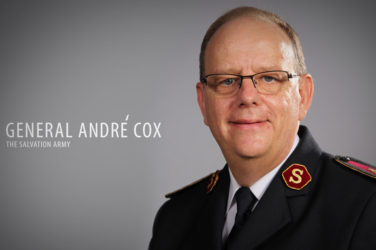by Phil Barrett
Corps Administrator
The Salvation Army Brown County, Ind., Corps (Church)

Over the years much has been written concerning church growth. Seminars, conferences, printed articles and individual discussions have been held, and thoughts on the subject have ranged from lofty ideals to practical ideas.
Despite having success in church growth over the years as a minister, no one person can be the definitive voice concerning this endeavor. Most people working in church ministry have their own style, method or opinion on how church growth works.
Everyone should have a desire to see their corps grow, not only in the spiritual growth of members but seeing a definite growth in numbers. I’ve said many times that every chair that’s vacant represents a person who’s not hearing the gospel of Christ or one who’s not growing in Christ. Remember: every statistic we submit represents a real person, not just a number.
People come to any given church to hear the Word, worship, build relationships, involve their family and serve. These five elements are critical for a growing church.
I’ve listed here some thoughts on church growth, not necessarily in any given order and certainly not a definitive or complete work on the subject.
Why & How
We must ask ourselves as we decide on our direction and vision of ministry, “Why are we doing what we’re doing?” We need to understand our community and its culture so we can minister to its needs. Avoid a cookie cutter, one-size-fits-all mentality. No one ministry can meet every need for all people.
Choose three to five types of ministries and develop those. When you try to do too many different ministries at the same time, there’s a tendency to be ineffective in your endeavors. You cannot meet every need, which is why there are many members in the body of Christ. Do what you do best and allow the Holy Spirit to guide you. Once the “why” is determined, develop the “how” to achieve your goals.
Develop Leaders
A good leader must first be a good follower. Those who lead best will not shy from doing the same work they’re asking others to do. Learn to be a servant leader—lead by example! Those you’re working with may be called employees or volunteers, yet they’re more that that—they are your coworkers, your fellow labors and must be treated with respect and love (1Corinthians 3:8, 9).
Always keep in mind you’re there to serve! Though you may have leadership authority, you must always maintain an attitude of humility, respect and kindness. Show respect at all times to those you’ve been called to serve, and never talk down to your staff or congregation (Philippians 2:2, 4).
Love, value, serve and always thank your people—they’re God’s blessing to you!
Welcome
Our corps motto is “Where no one is a stranger.” It’s on a banner outside our building as well as on the cover of our Sunday morning bulletins. The motto comes from having seen people over the years who felt “invisible,” as though no one knew they were there or no one really cared. When we say “Welcome to our church,” we must demonstrate and live out that statement. There must be a genuine, heartfelt desire to show a welcoming attitude not just by corps officers or lay leaders but the whole congregation. It must be a welcoming atmosphere.
Worship
Besides the corps officer, the most visible person on Sunday mornings is the worship leader. The officer and worship leader must share the same vision and direction for the corps because music is a powerful mode of ministry. It’s imperative for the congregation not just to sing but enter into praise of the Lord. The worship experience for many people is a vitally important part of deciding where they’ll commit their family for a church home. Give time to true worship, not just the singing of songs (Psalm 100).
Flow & Feel
Anyone responsible for preaching or teaching must make it a priority (2 Timothy 2:15). At least three elements are necessary for a good church service—passion, genuineness and purpose. The service should flow and not feel disjointed. If the congregation is continually standing up then sitting down, they may feel as though they’re exercising rather than being in church. I keep it to a minimum.
Some corps include an order of service in their bulletins. That’s fine, but you might try foregoing it. People tend to treat an order of service like a flow chart, mentally ticking off each element as it happens and even checking ahead in hopes things hurry along. Instead, try a natural flow, from praise to other aspects of your service.
As for feel, visitors should leave with a desire to come back!
Guard against becoming so formal, stuffy and rigid that you lose any freedom of the Spirit to move. But on the other hand, don’t become so informal that reverence for the Lord is lost. Find a balance that works for your congregation.
Vision
If you don’t know where you’re going, it doesn’t matter what direction you take; chances are you won’t get there. Don’t get caught up in the mindset of “I’ll know it when I see it.” You must have a clear vision of direction and a definite plan to get there.
Habakkuk 2:2 (NASB) says, “Then the LORD answered me and said, ‘Record the vision and inscribe it on tables, that the one who reads it may run.’”
- Define your vision. How you see your ministry will determine how you define it. When you have a vision of where you’re going as a corps, you’ll have a definitive direction and goals can be established.
- Make it known. Declare the vision over and over again! Preach and teach on the it—you can’t emphasize it too much because it will establish and reinforce who you are as a corps.
- Follow Up. Be sure to place written information about your ministry into the hands of visitors, then always follow up with visitors by a phone call or personal contact. It’s all about relationships, so be relational!
This should give you a foundation on which to build a solid corps. There’s no such thing as an all-inclusive, step-by-step process. Remember, it’s our Lord Jesus Christ who is building His Church. Our responsibility is to share His love, demonstrate His peace, flow in His joy, believe in His power, walk in His grace and stand upon His Word to honor Him.


